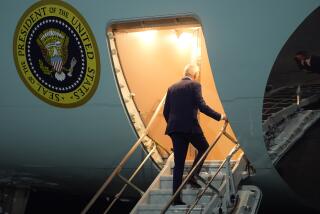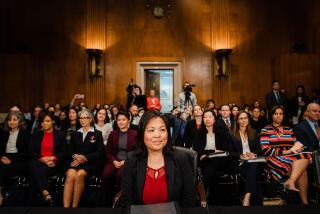Obama nominates Sen. John Kerry as secretary of State
WASHINGTON — President Obama nominated John F. Kerry, the five-term Democratic senator from Massachusetts, to replace Hillary Rodham Clinton as secretary of State, but delayed naming a new Defense chief amid growing criticism of the expected nominee for that post.
Appearing with Kerry at the White House, Obama said Friday that the 2004 Democratic presidential nominee and chairman of the Senate Foreign Relations Committee had “played a central role in every major foreign policy debate for nearly 30 years.”
“In a sense, John’s entire life has prepared him for this role,” Obama said.
Obama picked Kerry after the wrenching withdrawal of Susan Rice, his envoy to the United Nations, as his preferred candidate. The White House delayed the announcement to avoid interfering with national mourning over the mass slaying at an elementary school in Newtown, Conn.
Kerry’s nomination is likely to sail through Senate confirmation hearings, where he has strong support.
But it came as the White House struggled to pick a new secretary of Defense. Aides say Obama’s preferred choice is Chuck Hagel, a Republican and former U.S. senator from Nebraska. But Hagel faces mounting opposition from influential pro-Israel groups, gay rights activists and defense hawks.
Obama had been expected to announce both nominations Friday, but Hagel’s absence in the Roosevelt Room — and Obama’s refusal to answer reporters’ questions — suggested that the president may be considering other candidates. White House officials insisted that Obama had made no choice.
Kerry, 69, a highly decorated Vietnam combat veteran, later helped lead veterans opposed to the divisive war. Obama cited his military service as a special qualification.
“Having served with valor in Vietnam, he understands that we have a responsibility to use American power wisely, especially our military power,” Obama said. “And he knows, from personal experience, that when we send our troops into harm’s way, we must give them the sound strategy, a clear mission and the resources that they need to get the job done.”
The nomination risks the loss of what has been a reliable Democratic seat in the Senate. Democrats control the Senate by a 55-45 margin but face midterm elections in two years that could narrow the difference.
Scott Brown, a Massachusetts Republican who lost his Senate seat in last month’s election but remains popular in the commonwealth, could run again in a special election next year. Edward Kennedy Jr., son of late Sen. Edward M. Kennedy — whom Brown succeeded — is among several Democrats who have indicated interest.
Rice withdrew from consideration Dec. 13 after a tenacious campaign by Republicans who said she misled the country after armed militants killed four Americans in September at the U.S. diplomatic mission in Benghazi, Libya.
Several GOP lawmakers who led the opposition to Rice, including Sen. John McCain (R-Ariz.), urged Obama to choose Kerry instead.
McCain praised the nomination Friday, but also said he intended to carry out his responsibility to carefully review Kerry’s suitability for the post.
Obama, in his remarks, acknowledged the special debt he owes Kerry.
In 2004, when Kerry was running for president, he chose Obama to deliver the keynote address at the Democratic National Convention, providing the obscure state senator from Illinois an invaluable introduction to U.S. voters.
Republican hawks may challenge Kerry’s resistance to U.S. military intervention abroad in some conflicts. And a group of Vietnam “swift boat” veterans who opposed his presidential campaign have vowed to voice their objections again.
Kerry has shared Obama’s interest in trying to talk without preconditions to adversary governments, and he shares Obama’s desire to shift the U.S. military from the grueling ground wars of the last decade to a “light footprint” abroad.
Kerry “would much rather solve problems by negotiations and diplomacy than by war,” said Jonah Blank, a former Kerry aide and South Asia specialist. “He’s seen war: He knows it ain’t pretty, and very often it doesn’t work.”
At the beginning of Obama’s first term, Kerry sought to help the White House work out a broad Mideast peace deal with Syrian President Bashar Assad — a mission that continues to come under strong criticism by Republican hawks.
Kerry also acted on Obama’s behalf as a diplomatic middleman in sensitive talks with Afghan President Hamid Karzai, and helped soothe relations with Pakistani leaders after a period of intense turmoil.
Kerry, whose father was a foreign service officer, has traveled widely and has shown himself willing to take on the wearying drudgery of diplomacy. Also like Clinton, he has shown an ability to talk to foreign leaders as fellow politicians, a valuable asset.
Another arguable advantage: Kerry, a tall man with a stentorian voice and what is sometimes described as a patrician bearing, looks and sounds the part of America’s top diplomat.
Rudy DeLeon, a former Senate Democratic aide and Pentagon official during the Clinton administration, said Kerry would come to the job well-versed on the issues and with relationships that would be valuable to the White House.
“The Senate is going to be a key participant in much that the administration does on foreign policy, so his relationships there will be an asset,” said DeLeon, now with the Center for American Progress, a Democratic-leaning think tank. “And he has ties to world leaders from China to the Middle East.”
Obama has let slip to aides that he has sometimes found Kerry long-winded. Still, it is clear the president is comfortable working with him, and Kerry has won points by being a good partner to Hillary Clinton.
One issue for Kerry will be whether he becomes frustrated with how the administration’s foreign policy has been highly centralized in a small team around Obama.
But foreign policy experts believe Kerry — like Clinton — will be willing to take orders from the West Wing as long as he believes his views are being considered.
Kerry’s accomplishments as Foreign Relations Committee chairman include legislation he pushed, with ranking member Richard G. Lugar (R-Ind.) and House Foreign Affairs Committee Chairman Howard L. Berman (D-Valley Village), to restructure and expand aid to Pakistan. Kerry was also an important advocate for the New START nuclear arms reduction treaty with Russia.
Clinton has indicated that she is willing to remain in her post beyond Obama’s inauguration if necessary. But that may not be necessary with the selection of Kerry.
More to Read
Start your day right
Sign up for Essential California for news, features and recommendations from the L.A. Times and beyond in your inbox six days a week.
You may occasionally receive promotional content from the Los Angeles Times.







